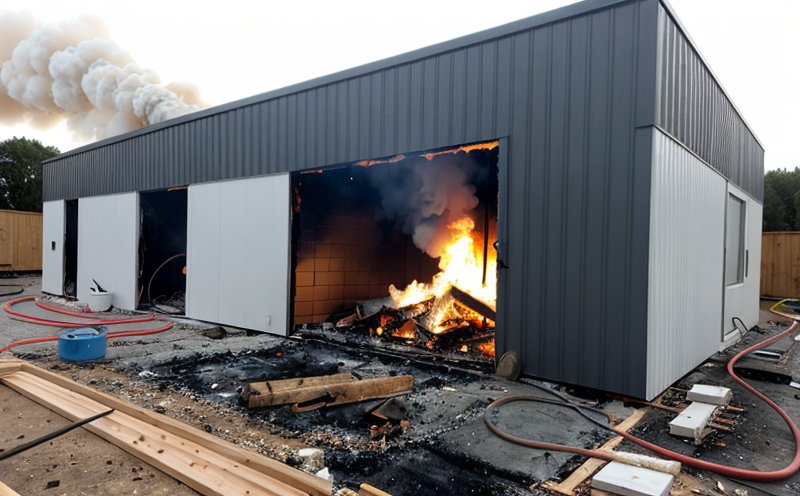EN ISO 11925-2 Ignitability by Direct Flame
The EN ISO 11925-2 standard is designed to assess the ignitability of insulation materials and cladding systems in direct flame conditions, which is critical for ensuring fire safety in buildings. This test method evaluates the ability of a material or system to resist ignition when exposed to a direct flame source. The standard is particularly relevant for manufacturers and installers of building products who need to ensure compliance with regulatory requirements.
The test procedure involves placing a specimen on an inclined panel, applying a specified flame under controlled conditions, and observing the behavior of the material or system. The specimens are typically cut into small rectangles measuring 150 mm by 300 mm, ensuring uniformity across all samples tested. Specimens for this particular test include insulation materials such as mineral wool, glass wool, expanded polystyrene (EPS), extruded polystyrene (XPS), and other similar products.
The direct flame is applied using a gas burner with a specific diameter nozzle, which ensures that the flame has consistent dimensions. The duration of the flame application varies depending on the material or system being tested; for example, it might last up to 10 minutes for insulation materials. After the flame is extinguished, the specimen is observed for any signs of continued combustion or melting. Compliance with this standard requires that the specimen does not ignite and should self-extinguish after the flame has been removed.
The test setup includes a specially designed apparatus to ensure accurate and repeatable results. This includes an inclined panel where the specimens are mounted, a gas burner for applying the direct flame, and a means of measuring and recording temperature changes during the test. The environment must be controlled to minimize external factors that could affect the outcome.
Specimen preparation is crucial in this testing process. The samples should be cut precisely according to the specified dimensions and orientation. It’s important to note that the specimens should not have any visible defects or irregularities that might influence the test results. Proper specimen preparation ensures that the test accurately reflects the material's performance under direct flame conditions.
The acceptance criteria for this test are strict, ensuring high standards of fire safety. Compliance with EN ISO 11925-2 means that materials and systems do not ignite or continue to burn after exposure to a direct flame source. This stringent requirement is essential in preventing the spread of fires in buildings, particularly important for critical infrastructure such as hospitals, schools, and public transportation hubs.
Applied Standards
The EN ISO 11925-2 standard is part of a broader set of standards designed to assess the flammability characteristics of materials. It is closely aligned with other international fire safety standards such as ASTM E648 and IEC 60695, all of which focus on providing consistent methods for evaluating material performance in various fire scenarios.
- EN ISO 11925-2: Ignitability by Direct Flame
- ASTM E648: Standard Test Method for Determining the Ignition and Propagation Characteristics of Materials Exposed to a Radiant Heat Source
- IEC 60695: Safety of Equipment in Flame-Resistant Environments
The use of these standards ensures that testing practices are consistent across different regions and industries, promoting global harmonization in fire safety. This consistency is vital for manufacturers and suppliers who need to ensure their products meet the same rigorous criteria worldwide.
EuroLab Advantages
At EuroLab, we pride ourselves on providing exceptional services that cater specifically to your needs. Our state-of-the-art facilities and experienced technical team ensure that every test is conducted with precision and accuracy. Here are some of the advantages you can expect from choosing us:
- Accurate Results: With our advanced equipment and skilled personnel, we guarantee reliable and repeatable results.
- Compliance Assurance: Our thorough testing methods ensure that your products comply with the latest international standards such as EN ISO 11925-2.
- Expertise in Fire Safety: Our team has extensive experience in fire safety testing, ensuring you receive the best possible service.
- Dedicated Support: We offer personalized support throughout your testing process to ensure everything runs smoothly.
We understand that time is of the essence, especially for businesses operating within tight deadlines. EuroLab prioritizes efficiency without compromising on quality, ensuring quick turnaround times and timely delivery of test reports.
Use Cases and Application Examples
- Hospital Facilities: Ensuring that the insulation used in hospital buildings meets fire safety standards is crucial for patient care. Non-compliance could lead to dangerous situations during emergencies.
- School Buildings: Educational institutions must adhere to strict fire regulations to protect students and staff. Regular testing of materials ensures compliance with these requirements.
- Railway Stations: Public transportation hubs like railway stations require robust fire safety measures to prevent the spread of fires, which can have catastrophic consequences for passengers.
- Data Centers: Modern data centers house sensitive information and critical infrastructure. Ensuring that all materials used in construction meet high fire safety standards is paramount.
In addition to these examples, many other sectors rely on our expertise in fire safety testing. By adhering to international standards like EN ISO 11925-2, we help ensure the integrity and safety of materials used across various industries.





